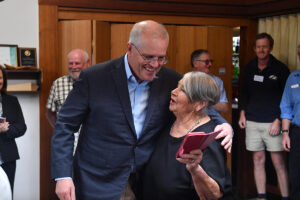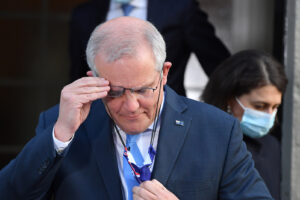Charles Firth
We need to start talking about the explosive culture of sexual assault and rape in high schools

This is an edited version of a speech that was delivered to five hundred year 9 and 10 female and male students on 3 March 2021 at a public high school in Sydney’s inner west for its International Women’s Day Assembly.
I am a change maker and I’ve worked for the last twenty years to try and make the world a better place. Standing here, I know I am not alone. I know many students and teachers at this school have been fighting for change for a long time. Today I want to run through three big lessons about what it takes to make change. They apply to climate change, and they apply to other issues too – big issues – like women’s rights, which we are celebrating today.
The first lesson is that the change that you want arises out of your experiences as well as from the injustices you see in the world beyond.
This probably feels upside down. Surely if you want to make change – you need to make it out there in the world, not think about yourself? But if you don’t look inside and explore where your passion comes from – you will struggle to stick at making change.
The first job I had after I left school was working for a lawyer – a very successful barrister. He worked in a glamorous legal chambers in the city. The offices were so high up that they had a view that overlooked Hyde Park and stretched out across the Harbour. I remember that when I started I was delighted that the staff kitchen was so generous that it gave out soft drinks for free!
My job was to help the lawyer with research and deal with documents. Sometimes I worked at a computer, other times I had to mark up large libraries of case law. To be honest, it wasn’t amazingly glamorous. I also spent a lot of time buying other people coffee or lunch. But it was a good start for someone who was 17 years old.
This job was a huge opportunity for me. I had just started a law degree and my goal was to become a barrister. I felt like this place could open the door to my future career.
One day I was in the lawyer’s office. I’d been marking up a massive library of law books. We were talking. At the end of the conversation he came over and gently smacked me, squeezed me, on the bottom.
I was shocked. I couldn’t believe what had happened.
I froze.
He left.
I felt sick in my stomach. I was embarrassed. It made me feel so small. I didn’t tell anyone for a long time. I felt powerless. There was nothing i could do – I kept saying to myself “he’s a lawyer god damn it, if I tried to do anything he would crush me!”
But I carried that experience with me. The older I got, the more aware I became of how many women around me – friends, family – had experienced similar things. I learnt about the importance of feminism. I became increasingly active on women’s rights issues.
I carry that experience still. When I saw on television that a young woman called Brittany Higgins had been raped in Parliament House by a fellow staff person – I instinctively wanted to support her. When she was undermined by the Prime Minister – when she was told to “go the police” rather than being heard and taken seriously – I got angry.
I hadn’t had an experience like hers of course, but I knew only too well that powerful men take advantage of women all the time.
Anger isn’t always a bad thing. Sometimes, being angry means that you are passionate about something. The anger is there to tell you that something matters to you. Understanding where the anger comes from, the particular experiences that you have had – like being sexually harassed by your boss – clarifies why you want to do something and gives you the energy to do it.
Lesson one is that when we look inside ourselves and what we have experienced – we can draw power and energy into how we can make a difference in the world.
The second lesson is that when you are fighting for change – while it is essential that the issue matters to you – that is not enough. It needs to matter to others as well.
We call it – working on issues that are widely and deeply felt. Something is widely felt when lots of people care about it. Something is deeply felt when people care about it so much that they have to act on it.
These aren’t the same thing.
Take climate change. About 80% of people care about climate change according to polls, but when it comes to taking action on it and demanding change – lots of people – especially older people – worry more deeply about jobs and the economy.
What does that mean? Should young people hate older people for being selfish?
Or, should we try and understand that everyone has a bunch of things going on in their lives – and good change makers try and build bridges with people across their differences?
Let’s use another example.
We are celebrating International Women’s Day and a couple of weeks ago a survey came out saying that there is an explosive culture of sexual assault and rape in high schools.
The survey focused on schools in the Eastern suburbs, just 10 kms away. It produced a google doc that now records over 2000 stories of young women each of whom had been sexually assaulted when they were around your age.
What should we do? Or should I say – what might you do?
This is a huge problem. Not just for those girls and women, but for every school. In this school too.
The statistics say that at least 2% of young women – that is at least 5 women in this room – will be sexually assaulted and report it to the police before they turn 18.
But we know that most people don’t report sexual assault, and police on their own can’t stop a toxic culture this widespread. This survey demonstrates this. Violence and intimidation including sexual assault – that is sex acts without full consent – are horrifyingly common in schools. They happen all the time.
I apologise if this has triggered you. I know this has happened to some of you. But we need to talk about it. This should not be something you should feel you have to keep to yourself, something that sits as private shame. This is why we still need to talk about women’s rights.
To the boys in the room – I know this is a difficult conversation.
But when I say – “what are ‘we’ going to do?” – I wasn’t just speaking to the girls.
Feminism used to be about women fighting on their own. But many women have realised that this isn’t enough. To build ‘widely felt and deeply felt’ change – we need men to stand with us.
We need to stand together.
Just like young climate strikers need alliances with older people worried about the economy, young women need alliances with good men.
In every social group – we know the boys who push it too far, who keep going even if a girl isn’t actually interested, or who encourage a girl to get drunk to make sex a little easier. The girls know it – and the boys know it too.
Boys – we need you to be good men. You need to call out this behaviour. You have a vital role to play.
Change making looks dramatic when it’s a strike in the city. But the most courageous change happens when you confront another person, a friend. When you tell them to stop. Face to face we can change each others’ lives.
The final lesson is that change makers sometimes need to step back to step forward.
The world is a complex place, and being a change maker can often feel hard.
I was part of a big social movement that tried to stop the War in Iraq in 2003. We held the largest rally in Australia’s history. There were two hundred and fifty thousand people in and around Hyde Park that day. That is two and a half times the size of the Climate Strike in the Domain in September 2019. It was enormous. We clogged the city.
The rally was part of a global weekend of peace rallies where over 10 million people marched. It was the largest set of coordinated demonstrations ever held in human history. And still the war went ahead.
What do you do when you aren’t winning? What do you do when things are tough?
Making change means taking the time to think, to reflect and to change yourself. It doesn’t mean burning the candle at both ends.
When the war went ahead in 2003 I was dejected. I felt lost. Eventually I realised I needed to take some time out. During my break, I went to the United States to find answers to questions I had about social change and about how to be a better change maker. Slowly I found new ideas.
In that time I helped found GetUp.org.au which now has over 1 million members, and then when I returned to Australia I founded the Sydney Alliance, the broadest and deepest coalition that has ever been built in this country.
These two organisations paved out new ways to make change – encouraging others to embrace digital campaigning and community organising.
Neither of these organisations would have happened if I hadn’t taken some time out. If I hadn’t stopped and reflected.
Taking a break isn’t giving up.
There is a famous parable about a tree ferler who is cutting down trees in a forest. She is sawing and sawing but getting nowhere because her saw is blunt, making the work harder and less effective. She’s exhausted and considers giving up. Then someone comes along and suggests – that she stops and ‘sharpens her saw.’ Taking a break transforms her productivity and gives her energy. Stopping actually strengthens her.
There is every chance that this talk has brought up some tough memories and experiences for some of you. I want to be clear about the lesson that I am sharing – the answer to feeling pain isn’t simply to act now. Rather something more profound may arise if you step back and sharpen your saw. Part of stepping back is giving yourself the space to reinterpret the source of your pain.
We are used to ‘keeping things to ourselves’, to keep things ‘private’ out of shame. But what is important is to realise that most pain isn’t just private.
When I was sexually harassed at work it wasn’t my fault. It had nothing to do with the length of my skirt. It was because we still live in a society where men are taught that it’s okay to objectify and use women.
That is a public problem.
What happened to me wasn’t only my problem. What happened to Brittany Higgins in Parliament wasn’t only Ms Higgins problem. What happened to the thousands of girls in the Eastern suburbs wasn’t only their problem.
It’s our problem.
All women live with it, and it is something that every man can choose to help fix. Together, this is something we can fix in public life.
But making change has to happen at the right pace. When scars are deep, time is required. We need time to heal our pain and sharpen our saw.
But when you are ready – I wish you a fiery heart, a steely mind and a creative hand in making all the changes that you need in this world.
Happy International Women’s Day.
Amanda Tattersall is a community organiser and researcher at the University of Sydney’s Policy Lab. She hosts the ChangeMakers Podcast which launched its fifth season this week.






